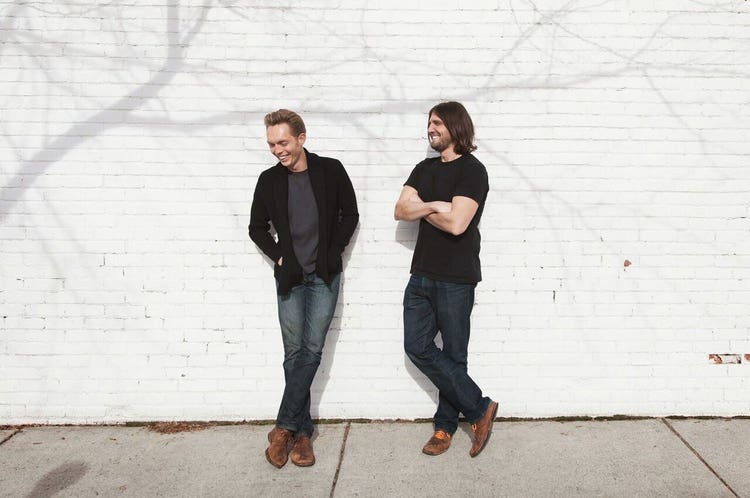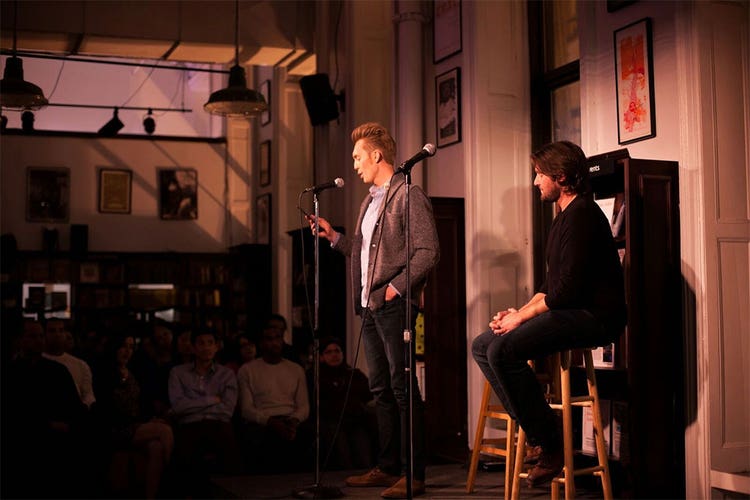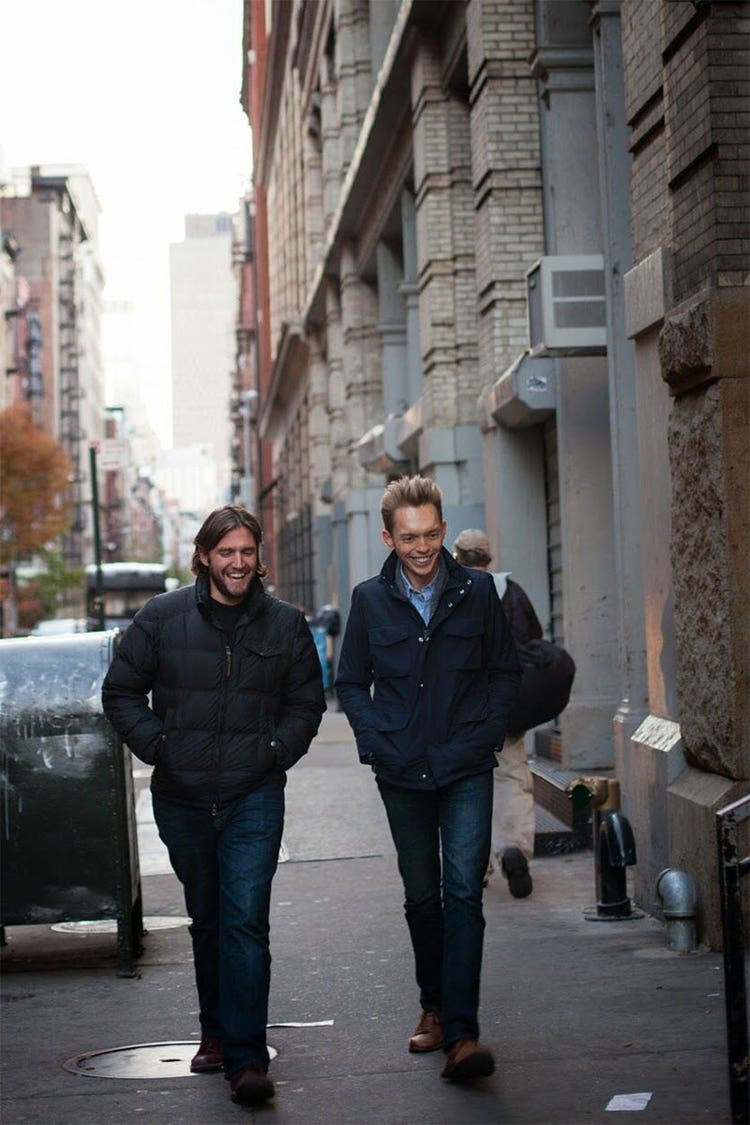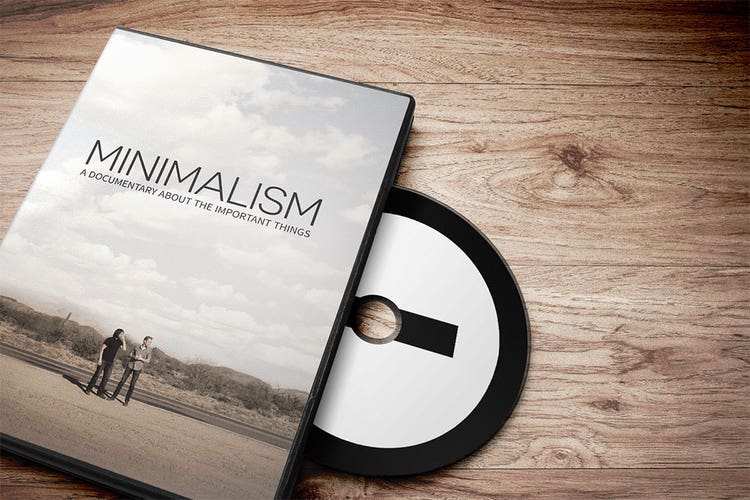Love People. Use Things. Meet The Minimalists.

Joshua Fields Millburn invites you to question what adds value to your life.
From Black Friday to Cyber Monday to holiday sales everywhere you look, millions of us obsess about material things and which gifts to buy loved ones for the ultimate holiday memory — whether or not we can afford the price tag. Along with that purchase often comes clutter, more debt and tremendous amounts of stress for all.
Pile that stress, anxiety and even depression on top of the demands of parties, shopping, baking, cleaning, entertaining, traveling and bad weather and it can lead many of us to ask ourselves, “Is it worth it?” At the same time, there is a growing sentiment beginning to question mainstream consumerism and calling for a simpler life.
To investigate the question, 24Life turned to Joshua Fields Millburn, who runs a popular website and podcast called “The Minimalists” with his business partner and friend Ryan Nicodemus. We asked Millburn for insight into gifts that matter, conscious consumption and how to live a more meaningful life.

It began with letting go
The Minimalists regularly ask their community of 4 million website readers how their lives might be better if they owned fewer material possessions. They also recently released a film that tries to get people to focus on the important things in life.
Millburn and Nicodemus didn’t always live this way. Both were high-income, aspiring professionals in Chicago, with all the worldly things that came with their success — houses, cars, status and so on. But they felt miserable.
In the fall of 2009, Millburn — recently divorced and grieving his mother’s death all in the same month — realized that his life could be different. Seeking solutions, he learned about minimalism and began questioning what he owned. Millburn says he ended up letting go of about 90 percent of his possessions, and his life was transformed. His newfound freedom and the happiness that came with it inspired Nicodemus, Millburn’s best friend of 20 years, to follow in his footsteps — and they became partners and started a blog to document their journey. “Minimalism was the thing that cleared the path for me and allowed me to get past the things I owned and let them go, in order to make room for life’s most important things,” says Millburn.

Liberation vs. deprivation
Millburn continues, “Minimalism was a key component in our journeys toward freedom and especially, financial freedom.
It started with things, and by clearing the clutter from our lives, we were able to focus on eliminating debt, changing our habits and making better decisions with fewer resources.”
He adds, “We also learned that by simplifying — by identifying which material possessions weren’t adding value to our lives — we were able to more quickly make improvements in our lives. For example, having less debt and better relationships made us ultimately freer to create in our lives and contribute our most creative work.” But Millburn says minimalism is not about deprivation, “And we are not trying to encourage anyone to follow us and ‘live without’ in the name of some movement called minimalism. We are not trying to convert anyone, really, or say that the minimalist life is for anyone or everyone. We are simply sharing a recipe and some ingredients, and what we are finding is that more and more people are searching for meaning in their lives.”
The Minimalists’ mission is, ultimately, “about showing people the benefits of simplifying,” and not just how to do it. “We all know there are many ways to declutter our closet or whatever,” says Millburn. “That’s great and useful, but not what we think is the most interesting question. We don’t care about the ‘how-to’ — we’re much more concerned with the ‘why-to.’ What’s the reason for simplifying? The ‘why’ is how your life might be better with less. It’s about being deliberate and being intentional.”
Millburn explains the Minimalists’ perspective on several aspects of the transition to intentional living and the life that results. On stuff …“We all need stuff. It’s not about the stuff. Or having less stuff or stuff that is better organized. We obviously have some real needs like food, water, housing and clothes. And, to live a fulfilling life, we need our health, our relationships and our sanity.” But, Millburn says, there are many things we do not need. “The majority of things we think we need are only things we want — often we don’t need them at all. So I don’t think consumption itself is the problem. Compulsory consumption is the problem. And we’re in a society where we think it’s our duty, our obligation to consume.”
Millburn says that that obligation can eliminate freedom of choice. “We think we’re consuming these things, but often they are consuming us: our time, our attention and our health. The goal is to get conscious and question if something is adding value to your life or not. If it does, then that’s good, but if it doesn’t, then you have a choice to make: keep it or discard it.”
If you stumble across something you think you need, ask yourself three questions: ‘When is the last time I used this?,’ ‘Does this thing add value to my life?,’ and ‘Is this something I can replace?’ Then return to the question of ‘How might my life be better with less?’”
On wealth …
Millburn says, “The shortest path toward wealth is to appreciate what you already have. Being rich is less about how much money we have and [more about] defining what we mean when we say abundance or wealth. Fundamentally, worth is not determined by our net worth. Furthermore, there isn’t any indication that having more stuff makes anyone any happier; in my case at least, and for Ryan, it was not true.”
Once you’ve defined abundance for yourself, Millburn advises, “Take a look at your day-to-day life — how full is it and what is filling it up? Is it what you want or something that feel you are obligated to do? We all need some stuff. We all have to pay the bills, right? It’s just that when we put those things first, we tend to lose sight of our real priorities. We lose sight of life’s purpose. For me, I’ve been focusing on the essentials of my life. I am rich because I have daily actions that match the person I want to be. I am 35 years old, and I am aspiring to be the 36-year-old version of who I want to be.”
On health …
From Millburn’s perspective, improving your health is the foundation of living a meaningful life. “Without your health, nothing else matters and it comes down to [the fact] that health is a matter of habits,” by which Millburn means that short-term actions have longer outcomes, and your habits today need to match the person you’re interested in becoming. “When I began to live more consciously, a side effect was that my health improved. I made different choices, I lost 80 pounds. I had more energy and felt better than I had ever felt before.”
He adds, “It is not static. It is always changing, and it is always good to ask the same question. ‘How does this activity or food add value to my life and also what is the outcome you want?’ [Don’t] wait for January 1, [an arbitrary] date to make a change in your life. Why wait?”

On time …
“One of the best benefits of paring down the stuff I had accumulated in my life was what I gained back, especially in the area of time,” says Millburn. “As I was able to reduce my commitments, I gained back time for what mattered to me. Time to create, time to relax, time to sleep and time to live. More free time in general. One of the main reasons we decided to take this journey was to reclaim our time: We wanted our lives back and to do so we had to get our time back.”
He adds, “Time is one of the things humans share in common: We all have the same 24 hours in a day. Let’s use them wisely. This starts with getting conscious about how we spend our time.”
On happiness …
Millburn observes, “Happiness is this interesting thing. Sam Harris, an American philosopher and neuroscientist, says we have been sold the meme of the American dream. If I add my take on this, it’s that the pursuit of health and happiness, which is a right (but now even thought of as an expectation), doesn’t fulfill on its promise — because what we really seek is to live a more meaningful life, and that means a different way of showing up now and today, and addressing our habits that are actually making us unhappy.”
“Everyone thinks they want to be happy,” he continues. “But happiness is an expansive concept and so many of us don’t take the time to answer what that means for us. For Ryan and for me, the thought of being truly happy [is what] led us to minimalism and the pursuit of a more deliberate, meaningful life. We embraced minimalism as a way of life and discovered that we, too, could be happy. But it wasn’t through owning more stuff, and it wasn’t through accumulation. We took back control of our lives so we could focus on what’s important — so we could focus on life’s deeper meaning.”
On relationships …
Minimalism is not just about living without things, according to Millburn. “It is about questioning your relationship to everything and using the same filter. ‘How does this add value to my life?,’ ‘What is your relationship to your work, to time, to your memberships, to the assumptions you make in your life?’ It’s easy to get in a rut and not make time for the people in our lives because of the life we have created. We have this philosophy that serves us well: Love People. Use Things.”
On giving gifts …
In case it seems like Millburn might reject the notion of the holidays altogether, he clears things up. “I love the holidays, and especially the nostalgia around them. It’s helpful to be conscious and intentional about the holidays and set expectations — [and better to do so] earlier in the year and not in the middle of the season. We have made so much out of gift giving, [and] not just [that it’s] obligatory and attached to specific, socially accepted days. We’ve conditioned ourselves that we must express our love through gifts. And not only that, we then have an expectation of a gift in return.”
Millburn says there is a great opportunity to approach the holidays differently. “Appropriate expectations are very important and require that we share intentions and have an initial conversation around gifts and holidays. Consciously choosing behavior is the goal, not compulsory gifting. And consider giving gifts on non-giving days, or making a contribution instead of a gift — or even host a charity holiday party.”
If a gift is key, Millburn suggests looking beyond material items. “Select gifts that are experiences, consumables and use the criteria of the same Minimalist questioning — does it add value to [the recipient’s] life? If so, be thoughtful. Choose something, preferably that you can share together and create a new and lasting memory. Your presence is the best present you can give to anyone.”
Ready for a Gift of Minimalism? Here’s How …
Step into a holiday and end-of-year challenge. Try the 30-Day Minimalism Game.
01. Choose a friend or family member, or a like-minded colleague who’s ready and willing to free up his or her life from things that no longer add value.
02. Start the game. On day one, get rid of one thing. Day two, two things. Day three, three items. Continue until, on day 30, you get rid of 30 things — not temporarily, but completely out of your home and your life. (Donating what you don’t want is the preferred method of removal, of course.)
Expect the game to be challenging, but you just might be rewarded by a feeling of freedom that you have never known. Remember, less is always more.
About The Minimalists
Joshua Fields Millburn and Ryan Nicodemus, known as “The Minimalists” to their 4 million readers, help people live more meaningful lives with less through their website, books, podcast and documentary. As featured on: ABC, CBS, NBC, NPR, BBC, New York Times, Wall Street Journal, TIME and The Atlantic. Find out more at TheMinimalists.com.